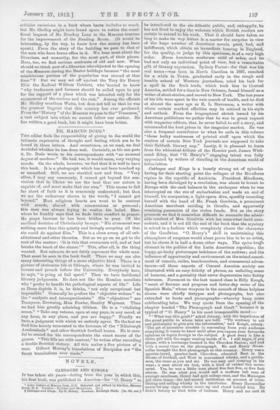DR. MARCUS DODS.*
Tun editor feels the responsibility of giving to the world the intimate expression of thought and feeling which are to be found in these letters. And sometimes, as we read, we feel doubtful whether he has done well. Certainly, as his son puts it, Dr. Dods wrote to his correspondents with "an unusual degree of candour." Ho had, too, it would seem, very varying moods. On the whole, however, we feel that it is well to have this book. It is a photograph which has not been touched up or smoothed. Still, we are startled now and then. "Very often, I may say commonly, I cannot get beyond the con- viction that in Christ we see the best that our nature is capable of, and must make that our own." This seems to fall far short of faith as it is commonly understood; but then we see the endeavour shown in the words, "I cannot. get beyond," Most religious hearts are wont to be content with creeds, shined with communions or personal ; this man was always trying to realize his belief. Else- where he frtulkly says that he finds little comfort in prayer. He prays because he has been bidden to pray. Of the cardinal doctrine of Christianity he says: "His atonement was nothing more than this quietly and lovingly accepting all that sin could do against Him." This is a clean sweep of all sub- stitutional and other theories. But as we go on we get to the root of the matter : 'It is this that overcomes evil, and at last breaks the heart of the sinner.'" This, after all, is the thing wanted. But extracts do not fairly represent the whole man. That must be seen in the book itself. There we may see also many interesting things of a more objective kind. There is a picture of strenuous life at Chicago, where he was invited to lecture and preach before the University. Everybody here, he says, "is going at full speed." Then we have incidental literary judgments. He does not like the Russian novelists who "prefer to handle the pathological aspects of life." Life as Ibsen depicts it is, he thinks, "not only exceptional but impossible." Generally he prefers the "objective writers" to the " analysts and introspectionists." His "objectives" are Tennyson, Browning, Miss Fowler, Stanley Weyman. Then we find him greatly admiring Gibbon. He is a "vitalizing ocean." " Tak0 any volume, open at any page, in any mood, at
any hour, in any place, and you are happy." Finally we have a judgment with which we entirely agree. To the last we find him keenly interested in the fortunes of the "Edinburgh Academicals " and other Scottish football teams. He is care- ful to record for his correspondents the exact scores of the games. "This fills me with content," he writes after recording a double Scottish victory. All this makes a fine picture of a man. Gilbert Murray's translations of Euripides are "the finest translations ever made."






















































 Previous page
Previous page